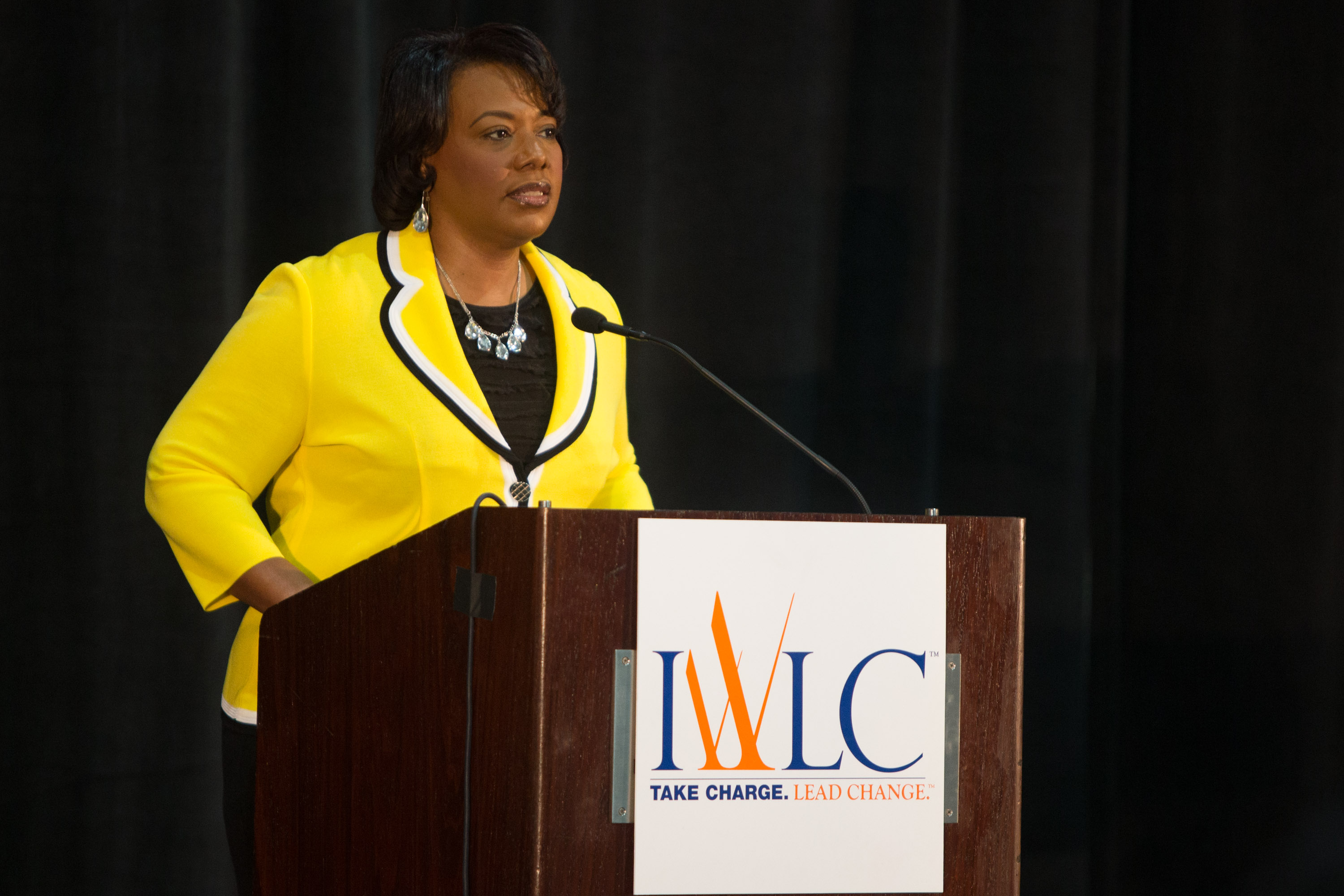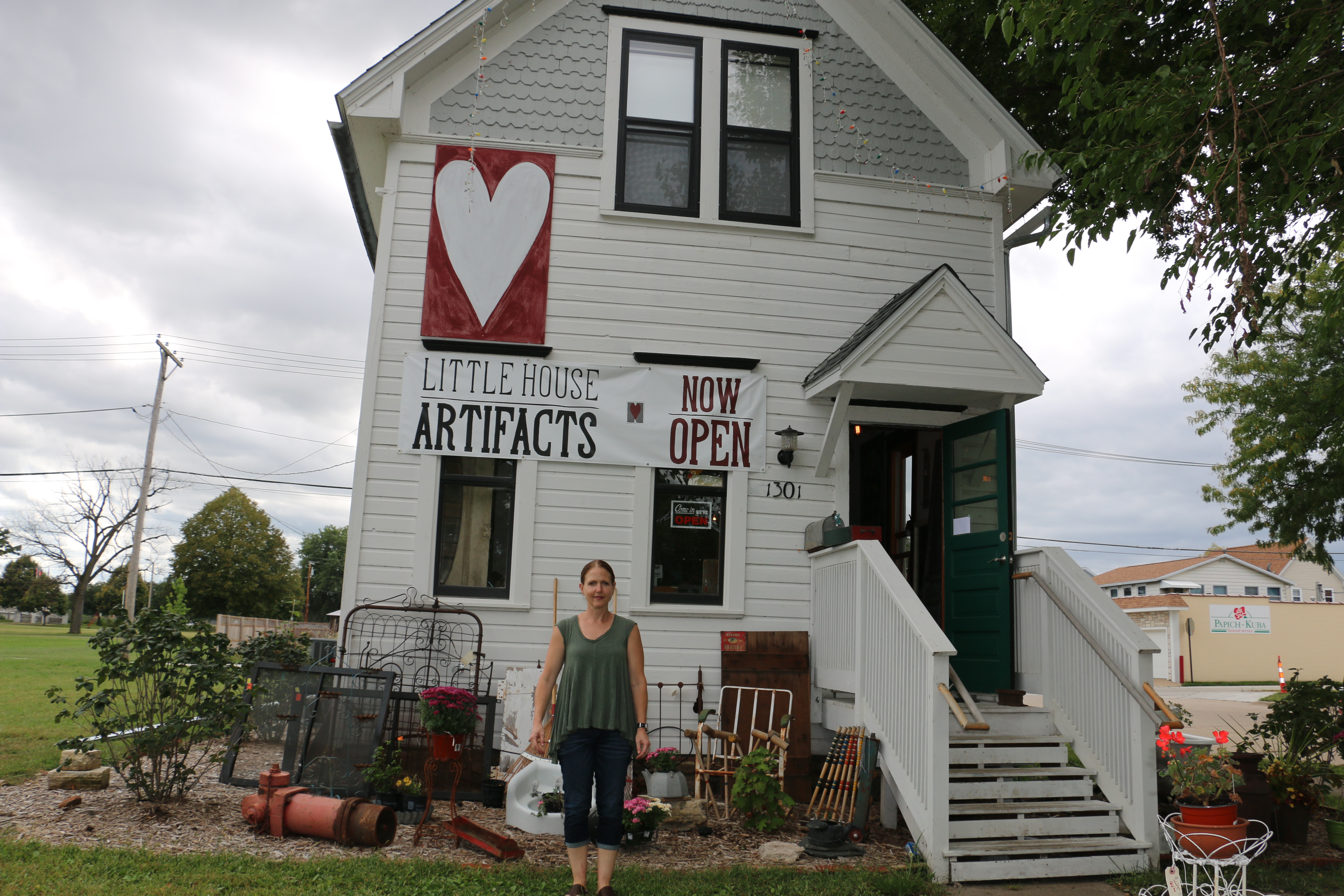
By Pat Shaver
CORALVILLE—When Coretta Scott King met her future husband, Martin Luther King Jr., she wasn’t interested.
She didn’t want to date a minister, and he was short, standing at about 5-feet-7- inches.
“He kind of grew on her. He got tall once he opened his mouth,” said Bernice King, the youngest daughter of the couple, who later married and became leaders as nonviolent activists in the freedom movement. Coretta remained active and aggressive in the movement after her husband’s April 1968 assassination.
“She was persistent and she was determined to keep his mission and legacy alive,” Ms. King said during her keynote address April 23 at the Iowa Women’s Leadership Conference (IWLC) at the Coralville Marriott.
What began as a two-day conference in April 2007, the IWLC has evolved into a broad-based organization offering comprehensive women’s leadership resources, including events featuring prominent speakers, frequent networking opportunities and other services. IWLC is an IRC 50(c)(3) charitable organization.
Ms. King’s mother, who died in 2006, is an example of the impact women can have standing beside powerful men, Ms. King said.
“Often when you talk about us as women, you tend to talk about the woman behind. The success of many men is the woman beside him,” Ms. King said. “She didn’t just marry the man she loved, she married the mission and the movement.”
Ms. King recalled an important moment in her mother’s commitment to the movement. It was Jan. 27, 1956. Her father received a threatening phone call telling him to leave town or their home would be blown up with the family in it in three days.
“Three days later my mother heard a thump on the porch,” she said. “And of course, the rest is history.”
After the explosion, Coretta’s father stopped by the home to pick up his daughter until the threats slowed down.
“She said very respectfully to my grandfather ‘I have to stay here with Martin,’” Ms. King said. “That particular moment was a turning point for a movement that had just begun.”
It’s important to keep her father’s legacy alive, but also her mother’s legacy, Ms. King said.
“When you talk about Martin Luther King Jr. moving forward, please don’t forget the woman beside him. She helped to raise her children and at the same time helped to raise the nation. She kept the dream alive and I hope you will too,” she said. “It can be very difficult for a man if his wife doesn’t have the same commitment he has. My father didn’t make any decision without consulting with God and consulting with Coretta Scott King.”
Her mother was an activist in her own right before meeting Martin Luther King Jr. After completing courses at Antioch College in Ohio, Coretta was told she would have to student-teach at an all black public school.
“She refused to comply. This refusal led my mom not to be awarded her degree. I wonder how many people do that today, take that kind of stance for that kind of loss,” Ms. King said.
Ms. King is the CEO of The King Center in Atlanta. She is a graduate of Spelman College and earned masters of divinity and doctorate of law degrees from Emory University. She noted, though, that she also attended Cornell College in Mount Vernon.
While serving as a law clerk in the Fulton County (Ga.) Juvenile Court system, she realized that many teens are victimized by society and by an ineffective legal system focused on retribution instead of rehabilitation. In her work with the Coretta Scott King Young Women’s Leadership Academy, she challenges girls to embrace a life of nonviolence as modeled by her father (“Kingian Nonviolence”). Through Be A King, which she founded, Ms. King seeks to re-brand and re-image generations of people to elevate the way they “Think, Act, Live and Lead.”
Gloria Steinem
When a reporter recently asked 79-year-old Gloria Steinem what she’s been most proud of during her active life, she said “I haven’t done it yet.”
An icon of the feminist movement and co-founder of Ms. magazine, Ms. Steinem is a writer, lecturer, editor, activist and frequent media spokeswoman on issues of equality. She is particularly interested in the shared origins of sex and race caste systems, gender roles and child abuse as roots of violence, non-violent conflict resolution, the cultures of indigenous peoples and organizing across boundaries for peace and justice.
Ms. Steinem gave the closing keynote address at the IWLC on April 24.
“We have the right to get mad. We have the right to have work we love. We have the right to change issues,” she said. “We are in the middle of the second profound change in social change.”
A woman’s right to control what happens to her body is an issue Ms. Steinem is passionate about.
“It is a battle we are going to continue to fight in many different ways,” she said. “We need to understand that social justice and the environment are all connected.”
She helped to found the National Women’s Political Caucus, a group that works to advance the numbers of pro-equality women in elected and appointed office; and the Ms. Foundation for Women, which supports grassroots projects to empower women and girls.
“We need to come together and realize that we’re not crazy after all. The system is crazy,” she said. “We are linked, not ranked, with each other, the environment and the world around us.”
Martha Stewart
Media and lifestyle mogul Martha Stewart spoke during the event last week, and promoted her latest book, “Living the Good Long Life: A Practical Guide to Caring for Yourself and Others.”
“Once you’re over 65, you’re no longer a sexy fabulous patient to your doctor,” Ms. Stewart said.
Her book focuses on how to remain healthy as a caregiver or a caretaker.
“Baby boomers are all turning 65 next year. Somebody needs to take care of them—us,” Ms. Stewart said. “There’s a lot of people, unfortunately, who are not so well at 65 and they need care.”
The Emmy award-winning television host, entrepreneur and bestselling author talked about the need to continue to grow and evolve throughout life.
“When you’re through changing, you’re through,” she said. “Change is good. I don’t mean dying your hair or losing 100 pounds, I mean evolving yourself. Don’t live other people’s life, live your own life and incorporate others into your life.”
Her namesake company, Martha Stewart Living Omnimedia (MSLO), which she founded in 1996, reaches about 66 million consumers across all media platforms each month with shows and publications such as Martha Stewart Living, Martha Stewart Wedding, marthastewart.com, “Martha Stewart’s Cooking School” on PBS, and Martha Live, a live daily radio show on SiriusXM.
Ms. Stewart was convicted in 2004 of charges related to insider trading and received a five-month prison sentence. That year, she stepped down as CEO of her company but has gradually reassumed responsibilities and was named chairman of the company last year.
“You have to learn to turn lemons into lemonade. Thankfully, I love lemons and lemonade,” she said.
MSLO also has a growing retail presence with 8,500 products in thousands of retail locations worldwide.
“What’s important to me, I think I have helped improve a lot of people’s lives with simple things and with some not so simple things,” Ms. Stewart said.
Barbara Annis
Barbara Annis, founder and CEO of Barbara Annis & Associates, Inc., a renowned expert on cultural and gender intelligence and inclusive leadership, discussed gender barriers in business at the conference.
The seven most common pitfalls for women in business, according to Ms. Annis:
1. Women don’t make bold requests.
2. Women avoid being too self promotional
3. Women are harder on themselves.
4. Women think if they work hard enough, it will be noticed.
5. Women tend to take on grunt work vs. high profile projects.
6. Women forget the importance of strategic networking
7. Women avoid the course of resolving challenging negotiations.
“Take action, don’t talk yourself out of it,” she said. “Remember you are part of a team, your success matters, be proud of your achievements.”
Ms. Annis’ newest book, “Work with Me: The Blind Spots between Men and Women in Business,” in conjunction with John Gray, author of “Men Are from Mars, Women Are from Venus,” exposes and debunks the blind spots that lay at the heart of miscommunications, misunderstandings, mistrust, resentment and frustrations at work.







